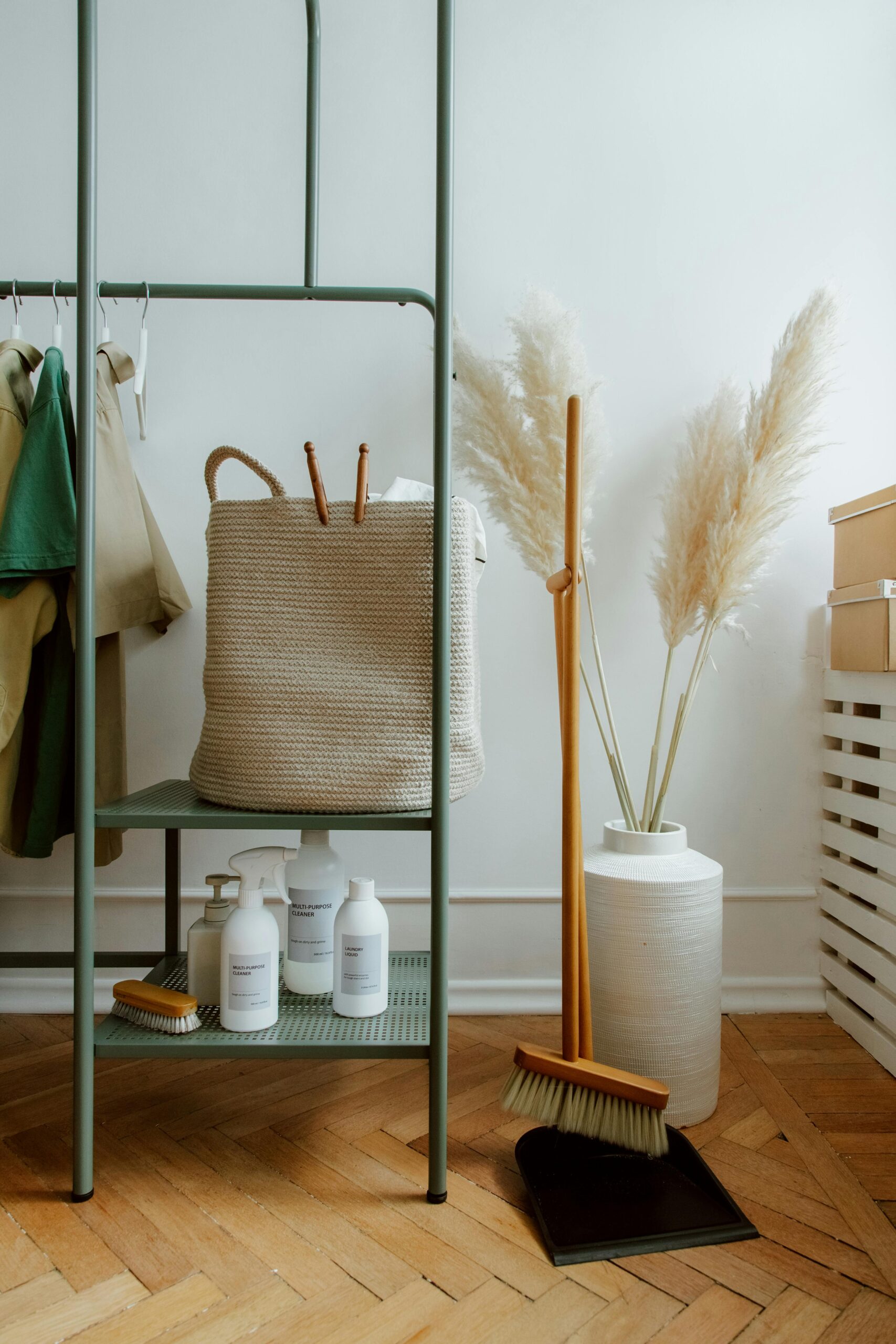
15 Jan Where Should Cleaning Supplies Be Stored? Best for Safe Storage
Discover the best places to store cleaning supplies for safety and efficiency. Learn proper storage tips and how to organize products effectively.
Where Should Cleaning Supplies Be Stored? Best for Safe Storage
Proper storage of cleaning supplies is essential for maintaining a safe, organized, and efficient household. Misplaced or improperly stored cleaning products can pose health risks, create unnecessary clutter, or become ineffective over time. This article explores the best practices for storing cleaning supplies to ensure safety, accessibility, and longevity.
Why Proper Storage Matters
1. Safety
Cleaning supplies often contain chemicals that can be harmful if ingested, inhaled, or come into contact with skin. Proper storage keeps these items out of reach of children and pets, reducing the risk of accidents.
2. Efficiency
Organized storage helps you find the products you need quickly, saving time during cleaning tasks.
3. Preservation of Products
Exposure to extreme temperatures, sunlight, or humidity can degrade cleaning products. Storing them in the right conditions extends their shelf life.
Ideal Locations for Cleaning Supplies
1. Under the Sink
The area beneath the kitchen or bathroom sink is a popular choice for cleaning supplies due to its convenience.
- Advantages: Close to water sources, easy to access during cleaning tasks.
- Tips: Use a caddy or organizer to separate products and prevent spills. Install childproof locks if there are young children in the house.
2. Designated Cleaning Closet
A dedicated closet for cleaning supplies is ideal for keeping everything in one place.
- Advantages: Ample space for brooms, mops, vacuum cleaners, and cleaning products.
- Tips: Use labeled shelves or baskets to categorize items and ensure proper ventilation to prevent chemical buildup.
3. Laundry Room
The laundry room is another convenient location for cleaning supplies, especially for products like stain removers and fabric fresheners.
- Advantages: Close to washing machines and dryers, making it easy to treat stains and clean fabrics.
- Tips: Store liquid detergents and bleach on sturdy shelves to prevent leaks and spills.
4. Garage or Utility Room
For larger or less frequently used cleaning tools, the garage or utility room can be a suitable storage area.
- Advantages: Space for bulk purchases and oversized items like buckets and carpet cleaners.
- Tips: Keep the area well-organized and away from items that could be damaged by moisture or chemicals.
5. Bathroom Cabinets
For quick access to bathroom-specific cleaning products, use the cabinets in each bathroom.
- Advantages: Convenient for cleaning mirrors, sinks, and toilets.
- Tips: Use small containers or trays to keep items tidy and easy to retrieve.
Best Practices for Storing Cleaning Supplies
1. Keep Products Out of Reach
Store cleaning supplies in high cabinets or locked storage units to prevent accidental access by children or pets.
2. Organize by Category
Group similar items together, such as:
- Bathroom cleaners
- Kitchen cleaners
- Floor care products
- Laundry detergents
3. Use Storage Containers
Plastic bins or caddies can help contain spills, make transportation easier, and keep products organized.
4. Label Everything
Clear labels make it easier to identify products quickly and prevent accidental misuse.
5. Store Away from Food
Never store cleaning products near food or food preparation areas to avoid contamination.
Temperature and Environmental Considerations
1. Avoid Extreme Temperatures
Store cleaning products in a cool, dry place. Extreme heat or cold can alter the effectiveness of certain chemicals or cause containers to leak.
2. Protect from Sunlight
Direct sunlight can degrade chemicals over time, reducing their cleaning power. Use opaque or shaded storage areas.
3. Minimize Humidity
High humidity can cause cleaning powders to clump or liquids to evaporate. Ensure proper ventilation in storage areas.
Products with Special Storage Needs
1. Bleach
- Store bleach in its original container, tightly sealed.
- Avoid mixing or storing it near ammonia-based products to prevent toxic gas production.
2. Aerosol Sprays
- Keep aerosol cans away from heat sources to prevent explosions.
- Store them upright to avoid leaks.
3. Flammable Products
- Store items like alcohol-based sanitizers and degreasers in a cool, well-ventilated space away from open flames or sparks.
Eco-Friendly Alternatives and Storage
If you prefer eco-friendly cleaning products, their storage needs are similar to conventional ones. However, natural ingredients like vinegar and baking soda are safer and less hazardous, especially in households with children or pets.
- Reusable Containers: Transfer homemade solutions to labeled spray bottles for easy use.
- Organized Shelf Space: Dedicate a specific shelf for natural cleaners to differentiate them from chemical-based products.
Common Mistakes to Avoid
- Mixing Products: Storing incompatible products together, such as bleach and ammonia, can lead to dangerous chemical reactions.
- Ignoring Expiry Dates: Old products can lose their effectiveness or become unsafe. Regularly check and dispose of expired items.
- Overcrowding Storage Areas: Overloaded shelves increase the risk of spills and make it harder to find what you need.
External Links for Further Reading
- How to Store Cleaning Supplies Safely
- Chemical Storage Guidelines
- Eco-Friendly Cleaning Tips
- Organization Ideas for Cleaning Supplies
Conclusion
Storing cleaning supplies properly is vital for maintaining a safe, efficient, and well-organized home. By following the tips outlined above, you can ensure that your cleaning products remain effective, easily accessible, and safe for everyone in your household. Whether you have a small collection of natural cleaners or a wide array of specialized products, proper storage practices make a world of difference.
